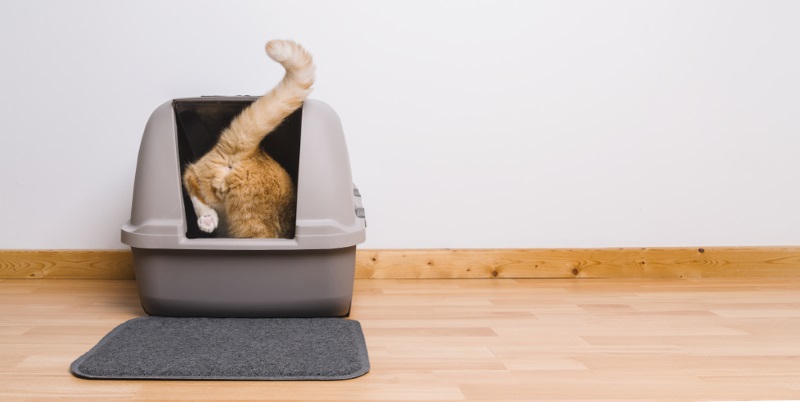
Has this ever happened to you?
You’re scooping out your cat’s litter box when you see something alarming: blood in your cat’s stool. Just what does it mean if you see blood in cat poop? And how worried do you need to be?
Blood in your cat’s stool can vary in appearance. Bright red blood in stool (hematochezia) is fresh and black blood (melena) is older—it appears black because it’s been digested or partially digested by the cat. Black or tarry looking stool is an emergency.
Quick Overview: Blood In Cat’s Stool
 Urgency: High
Urgency: High
 Requires Vet Visit: Yes
Requires Vet Visit: Yes
 Seen in Cats: Moderately Often
Seen in Cats: Moderately Often
 May be Linked to: Intestinal parasites, inflammatory bowel disease, infection, megacolon, foreign material in the digestive tract, dietary indiscretion, dietary change, medication intolerance, anal sac disease, cancer.
May be Linked to: Intestinal parasites, inflammatory bowel disease, infection, megacolon, foreign material in the digestive tract, dietary indiscretion, dietary change, medication intolerance, anal sac disease, cancer.
 Treatment Options: Treatment depends on the underlying cause, but may include dewormers, antibiotics, anti-inflammatories, fiber supplements, probiotics, and therapeutic diets.
Treatment Options: Treatment depends on the underlying cause, but may include dewormers, antibiotics, anti-inflammatories, fiber supplements, probiotics, and therapeutic diets.
What Causes Blood In Cat Stool?
Blood in cat stool is most often caused by colitis (inflammation of the colon). Although colitis is one of the most common reasons for blood in a cat’s stool, colitis is a symptom rather than a diagnosis.
Colitis is a general term that describes inflammation of the colon, which is part of your cat’s intestinal tract.
Bloody stool can be caused by many different things. Here are some of the most common causes:
- Anal gland (anal sac) infection, impaction or abscess
- Anxiety
- Bacterial infection
- Blood clotting disorder
- Cancer
- Constipation
- Dietary changes
- Dietary indiscretion (eating inappropriate or spoiled food)
- Food allergy/food intolerance
- Inflammatory bowel disease (IBD)
- Intestinal blockage (foreign body)
- Intestinal parasites (worms like roundworms or one-celled organisms like coccidia)
- Kidney disease
- Liver disease
- Medication intolerance
- Megacolon
- Pancreatitis
- Poisoning
- Rectal polyps
- Trauma (hit by car, animal attack)
As you can see, blood in a cat’s stool can have lots of different causes; some are minor, some are more concerning, and some are true emergencies. It’s impossible to know exactly the reason for the blood you are seeing in your cat’s bowel movements without a veterinary exam.
For example, changing cat food may cause blood in stool or having worms can cause blood in stool in cats. Seeking veterinary attention is vital any time you see blood in the stool, whether bright red or dark, black or tarry-looking.
Also Read: 10 Subtle Signs Your Cat May Be Sick
Should I Worry If My Cat’s Poop Has Blood?
Never ignore blood in a cat’s stool.
Blood in cat poop indicates that something is going on with her health. There are no home remedies for blood in cat stool. If you see blood or think you see blood in your cat’s poop, call your veterinarian to make an appointment to have her seen.
Consider The Following Scenarios:
1. You Just See a Small Amount of Blood in Your Cat’s Stool and the Blood Is Bright Red.
If your cat’s stool looks fairly normal and your cat is not acting sick, you can probably wait a day or two for the next available appointment.
Even if your cat seems to be acting fine, at the very least call your vet to have a conversation about what you saw in the poop. Although a normal cat might experience blood in the stool occasionally, it’s still worth investigating.
2. You See Dark Blood (Dark Red, Black or Tarry Looking).
In some instances, blood in cat poop requires more urgent veterinary care. your cat must be seen immediately—your cat may be experiencing internal bleeding and this cannot wait.
3. You See Any Amount of Blood, and Your Cat Is Acting Sick or Has Other Symptoms.
Stool can tell you a lot about cat health. If the blood is bright red and your cat is also experiencing diarrhea or vomiting (or both), if your cat has lots of slimy mucus as well as blood in her stool, if the amount of blood is excessive, if your cat is eliminating outside the litter box, or if your cat is showing other signs that she is feeling sick (cat is hiding, cat is not eating, cat is lethargic), get her to a veterinarian to be checked as quickly as possible.
Don’t wait until morning. This might mean a trip to an emergency animal hospital if it’s after normal business hours or over a weekend or holiday. If possible, bring a fresh sample of your cat’s bloody stool with you to the vet.
Also Read: Best Pet Insurance For Cats
What Will the Vet Do for a Cat With Bloody Stool?
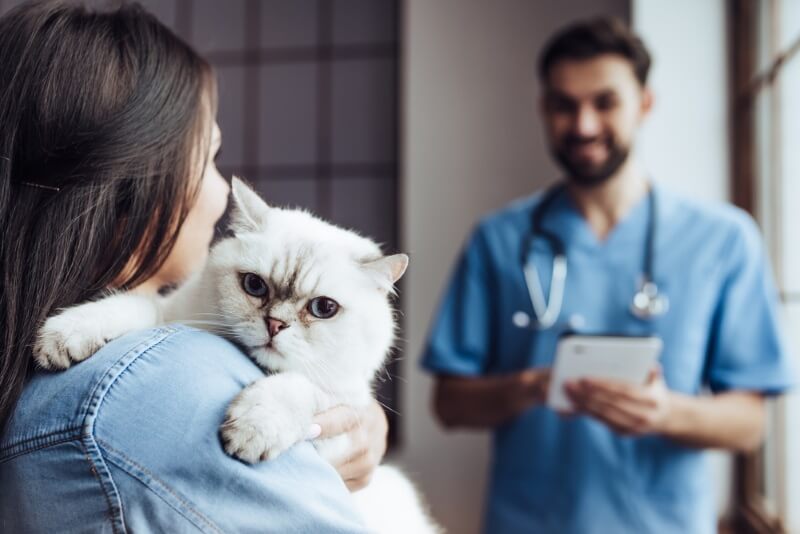
Once you arrive at the hospital, the veterinarian will usually do the following:
- Take a medical history from you, asking about your cat’s health, environment, and lifestyle.
- Conduct a complete physical examination of your cat, feeling her body and looking into her eyes, ears, and mouth.
- Perform a fecal test on your cat’s bloody stool (this is why it’s helpful to bring a stool sample in with you).
Depending on your cat’s other symptoms and the type of blood seen in the stool (bright red or black), the veterinarian might also want to:
- Draw blood for blood work, such as a complete blood count (CBC).
- Collect urine for analysis.
- Take X-rays or perform other diagnostic tests like an ultrasound.
- Recommend exploratory surgery or endoscopy.
If you end up going to an emergency animal hospital, your cat may be transferred to your regular veterinary clinic for further care in the morning.
Treatment for blood in cat stool is highly dependent on the cause of the bleeding. Once your veterinarian is able to pinpoint the source of the blood in your cat’s stool, he or she will be able to identify an appropriate treatment. Your cat may require fluids, medications, special food, or other care.
Blood in Cat Poop but Acting Normal—Do Not Ignore It
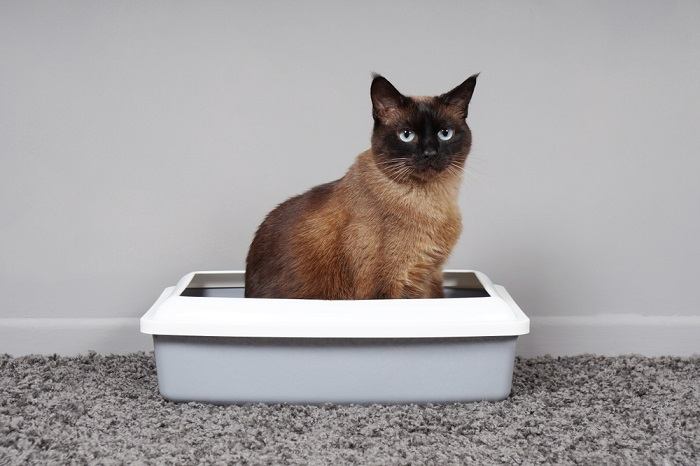
If you see blood in your cat’s poop, don’t panic, but do have your cat checked by a veterinarian as quickly as possible. With cats especially, it’s never a good idea to delay seeking veterinary care.
Cats are evolutionary programmed to hide their illnesses. In the wild, a sick or injured cat could become a target for a larger predator.
This is the reason cats often hide their pain and discomfort. Sick cats will often act completely fine—until they’re not. Signs of illness, like loss of appetite and weight loss, can be difficult to notice, especially in older cats.
By the time you realize something is wrong with your cat, the issue may become more complicated. When this happens, the treatment may be more invasive and more costly.
Delaying treatment can lead to worse outcomes for the cat. It’s always better to be safe than sorry, and bring your cat in for an exam if you see blood in your cat’s stool.
Disclaimer: This article is for informational purposes only and is not intended to be a substitute for professional veterinary care. Always talk to your veterinarian about questions you may have regarding your pet’s medical condition. Do not delay seeking professional veterinary advice because of something read on the internet.

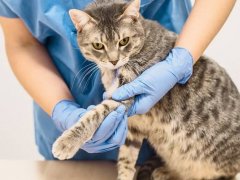

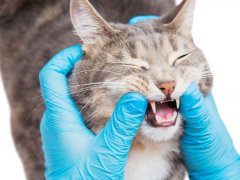

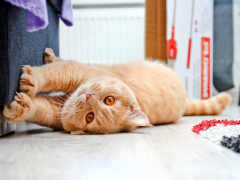
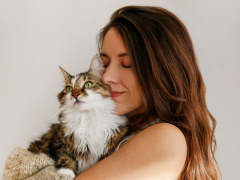
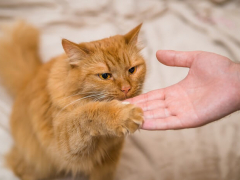
Thank you for your reply! My kitty is fine. I watched him like a hawk to see if things would get better, and had my daughter take him to her home where he has playmates to keep him entertained and not so interested in his high wire diving that he was doing here. Potty issue stopped. My extreme anxiety over his safety stopped. Although I miss him very much, I can visit him whenever I go see my kids and grandkids. And their pets (2 dogs and a boy cat) adore him and think he is their own baby!
Hello, my daughter brought me a 12-week-old male kitten. He is EXTREMELY active. I am in a wheelchair, and it is very stressful trying to keep him off of high places in my apartment, for his own safety. I had my daughter place objects in the way so that he cannot reach the high spots-refrigerator, high opening between kitchen and living room, high shelves in closets. Even though he is very small, he still manages to get up into the high places! The first time I could not find him, and he literally leaped down, landing on my head, scratching me to bits. The next time, same spot, but he hit my wheelchair coming down. He seemed dazed but ok. His activity level is just plain WILD. I play with him a lot. He wants to eat every hour, which I do not indulge him. He eats a combination of wet and dry, since he is neutered. He is very clean, no potty issues. Except a few days ago, I was cleaning his litter box and there was black, extremely sticky mud at the bottom of the litter box. It was really hard to pry it loose, and came out in little black balls-even though I clean his box every time he poops and every other day I clean the whole box. This kitty needs 24-hour surveillance, he tries to eat everything. I end up having to keep him in the bathroom at night so that I can relax because even though he is a love bug, he is exhausting. I have yo change my apartment around every single day yo prevent him from getting hurt. Do you think that he may have actually hurt himself when he came flying off the high spot between the kitchen and living room? It’s the only thing that I can think of-except he has yanked open my duct- taped closet doors and leaped up to the second shelf (about 6 feet high), knocked down metal wheelchair legs, and landed in them! I am living in disability income and cannot just take him to a vet for no reason, but I do love him and want him to be okay. But if he has hurt himself, it will continue happening because I have de-catted my apartment to keep him safe, and yet he still is a daredevil! I foolishly thought he couldn’t possibly do the things he does until he was much older!
Hello Kim, apologies for the delayed reply! This is an excellent question—I can’t say for certain why your frisky kitten’s poop looked like this, and it’s impossible to authoritatively rule anything out without veterinary training or being able to see your cat. However, the way you’ve described his mischievousness and the consistency of the poop makes me wonder if he may have eaten something he shouldn’t have or was injured—black, sticky poop is indicative of internal bleeding and should be treated like an emergency. If you didn’t go to the vet immediately, I’m curious about what happened—I would continue to monitor his litter box and also watch for any behavioral changes or other symptoms that could suggest that something is wrong. It sounds like you and your daughter have done everything you can to try to keep him safe, but it is possible that an accident would happen. This seems like something you’ll more of less have to ride out—he’s reaching the peak of the playful kitten phase, but this should calm down with age. Hoping everything is okay.
My cat has blood in her stool and I have no money or credit. What do I do? She acts normal
As stated in the article, blood in your cat’s stool may or may not be a sign of serious illness, and your course of action will differ depending on how serious the underlying cause is. I would recommend monitoring your cat closely, and if this continues, contacting a vet.
My kitty is qute skittish and has anxiety when I go on a trip. Twice now she has had blood in her stool which is soft but not diarrhea. Could it be from anxiety? She is eating almost her normal amount. She is a Snowshoe.
Hi Nancy, sorry to hear your kitty isn’t feeling well! Blood in the stool is definitely cause for concern and should be addressed with your vet. While changes in stool consistency could be related to anxiety, blood in the stool is less common than soft stools or diarrhea. It does happen sometimes, however, with severe stress. We have a post here about coping with cat anxiety, but I’d still recommend bringing it up with your vet:
https://cats.com/cat-separation-anxiety
I have 5 year old cat that has loose stool and a little bit of blood in it. Most of her poop has been normal but a few times it been runny, should I be alarmed?
Hi there! Sorry about the late reply. Yes, repeated appearances of loose, bloody stool is a concern, even if it’s interspersed with normal poop. I would talk with a vet!
I have a 8 wk old kitten. He had bloody poop. Until he went in his litter box with that he was not pooping in the box. Should I be alarmed. It’s the first one.
Hello Cindy, I would certainly consult with a veterinarian about this. Blood in a cat’s stool can point to a range of issues, both serious and not, but it’s important to get expert guidance.
You can’t put a cat down just because she does wee outside litter tray. She might have an infection or irritable/ sensitive bladder that makes her lose control. Is the tray clean. Put some incontinence pads around the tray, I did this with my kitty. Even if she misses the tray, there will be very little mess
My cat Shadow is 19 years old. This last few months she has been popping outside the litter box but peeing inside. One day this last week she peed on carpet by the room where her litter is. My husband wants to put her down I don’t
Same as people, things become more difficult
Get a litter box with lower sides and make sure it big enough
They make a box with one low side. Or you can cut it down.
Also as they age she may not get the signal on time or can’t make it to the box, animals do get a bit of dementia sometimes too
Maybe bring her to the vet and get an opinion. Sometimes it’s best not to let them suffer, but I don’t know the situation. It’s never an easy decision